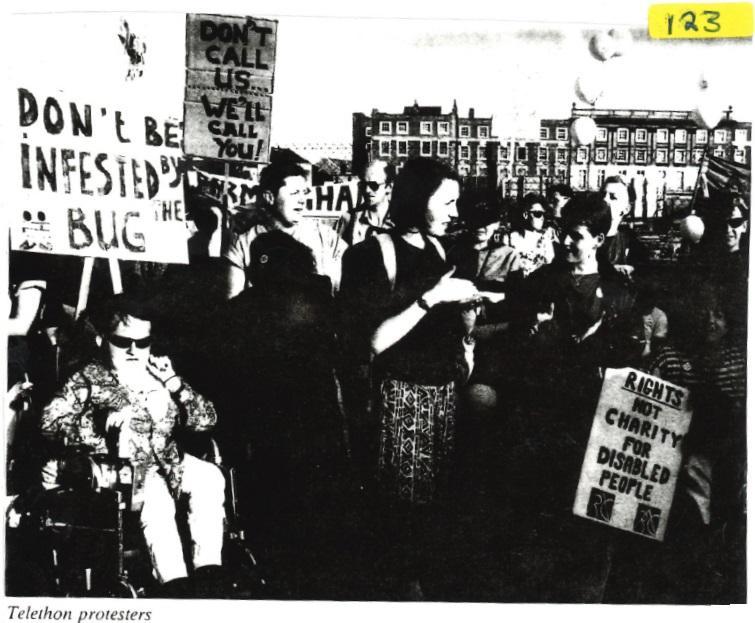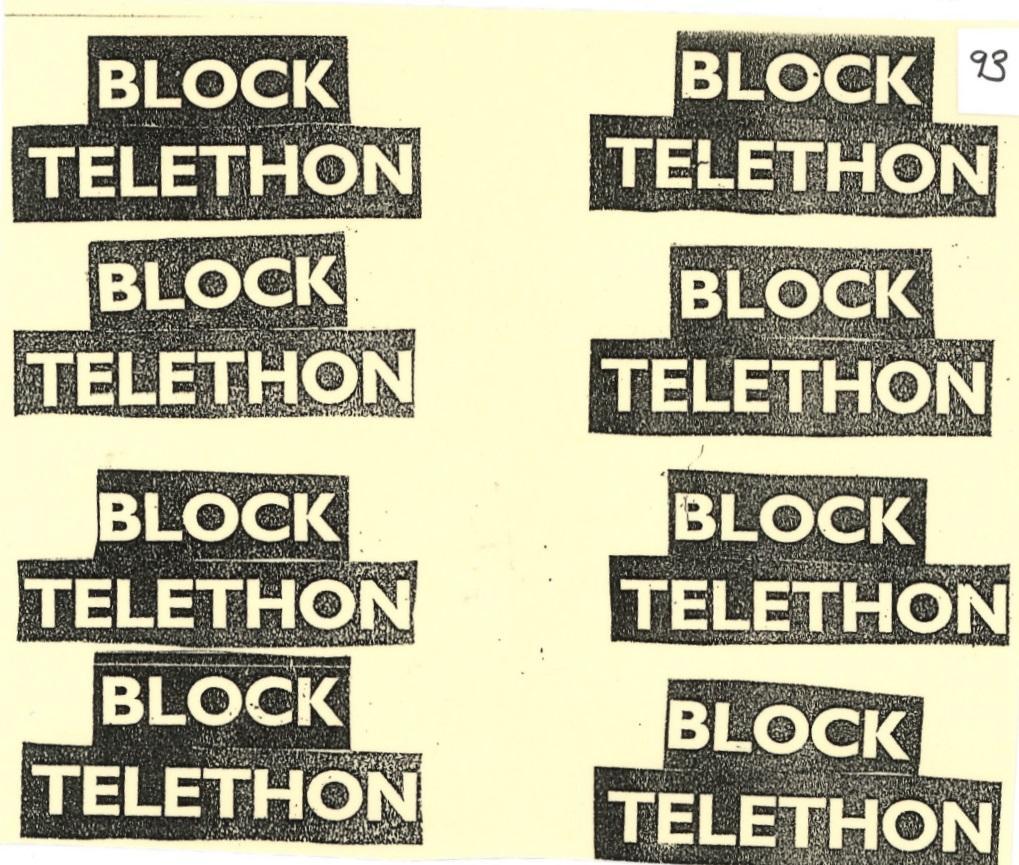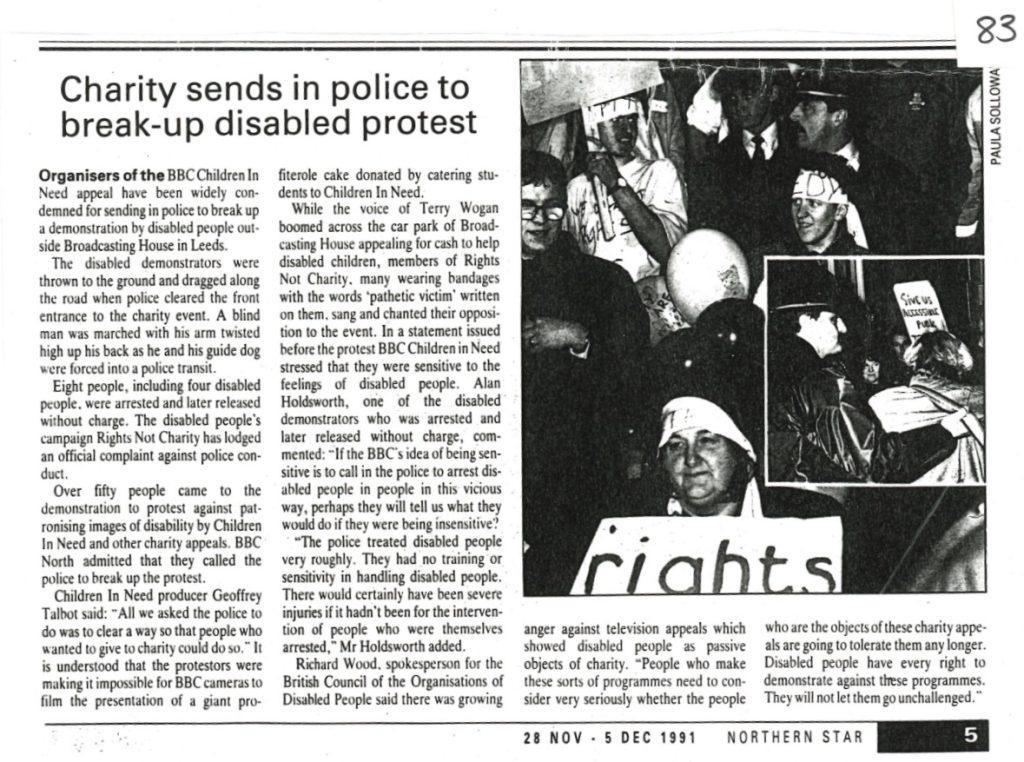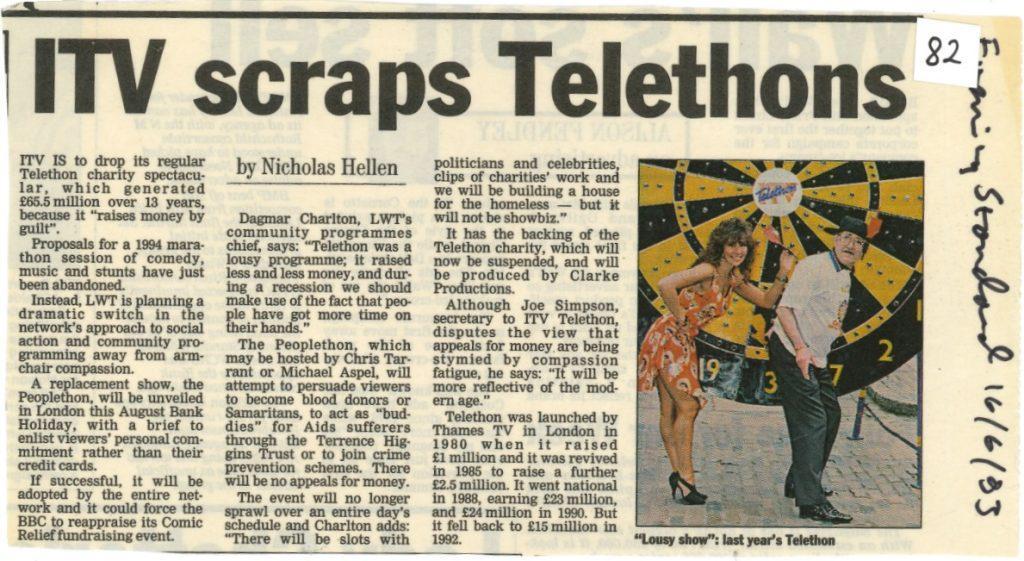"Poor Dear" by Ian Stanton
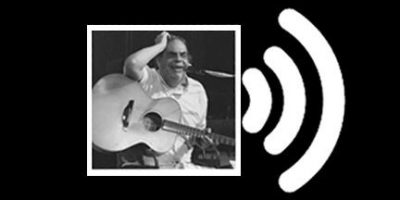
This song was written by Ian Stanton for the 3-part 1994 BBC documentary "Poor Dear", presented by Sian Vasey, which was about how the big disability charities actually do more harm than good for disabled people, and featured several other well-known figures in the Disabled People's Movement and Disability Studies, including Ken Lumb, Mike Oliver, Len Barton and Tom Shakespeare.
Music is slow acoustic guitar and keyboards.
Poor Dear
Song by Ian Stanton
Charity, charity, charity knocks
Smiling so gratefully, rattling the pots
Selling you distance, spilling the pot
Does anyone care where it goes?
Charity, charity, charity knocks
Millions, billions, charity’s pot
Changing society – well, not a lot...
Are we still in need, do you suppose?
Society’s plaster
To heal all the fractures
A band-aid to cover the soul
Poor dear
Never be your poor dear
Poor dear
Never be your poor dear
Charity, charity, charity knocks
Streets full of posters, trading my luck
More helpless, appealing? Better to chuck
One more agency’s image will glow
Charity, charity, charity knocks
Using my image to get what you’ve got
An object of charity – that I am not!
And I’ll make sure that everyone knows
I know my own mind
I know the storyline
I’ve been by here before
Poor dear
Never be your poor dear
Poor dear
Never be your poor dear
Charity, charity, charity knocks
Poking my person, probing my thoughts
All for normality – normal is what?
Somehow they never will say
Charity, charity, charity knocks
Cure the poor cripples, cause them to walk
Everyone’s able to see, walk and talk
Except the failures, and they’re locked away
Do I trust in your science?
Feed your reliance
On me as the object? No!
Poor dear
Never be your poor dear
Poor dear
Never be your poor dear
Poor dear
Never be your poor dear
Poor dear
A Tribute to Maggie Davis
At GMCDP and the Disabled People's Archive we were greatly saddened to hear of the recent death of Maggie Davis (also known as Maggie Hines) in March 2024.
Maggie, along with her partner Ken Davis, was a member of UPIAS and a co-founder of Derbyshire Coalition of Disabled People (DCDP) and Derbyshire Centre for Integrated (later Inclusive) Living (DCIL).
She was a pioneer of Independent Living in the UK, her involvement in the Disabled People's Movement starting from her experience of living in the groundbreaking Grove Road housing scheme in Sutton-in-Ashfield, Nottinghamshire. The history of this is documented in 'To and From Grove Road', a collection of Maggie's and Ken's writings which was compiled and published by Tony Baldwinson.
In the early 1980s, Maggie was featured in a documentary film called "Independent Living", made by the Greater Manchester Housing and Disability Group, that we recently found in our video archive. As a tribute to her, we are now sharing this publicly.
The film features interviews with both disabled people, including Maggie and Ken Davis, and representatives of local authorities and housing associations, talking about how accessible housing and personal assistance services - both of which were in very early stages of development in the UK at the time - could give disabled people control over their everyday lives and prevent them from having to move into institutional settings.
There were several different versions of the film in our video collection, each with different parts included and cut out. We have combined these into the most complete edited version that we could make, though unfortunately there are still some parts where footage or narration seems to be missing. We have also added subtitles to the video.
You can read a transcript of the video here.
Maggie and Ken were also interviewed in a video called "Proud to be Disabled" which was produced by Birmingham City Council's Equalities department in 2004. We have subtitled, and are sharing here, the section of this video featuring them.
You can read a transcript of the video here.
We are also sharing an article by Maggie Davis called "The Way Back", also on the subject of housing, personal assistance and de-institutionalisation, which was originally published in Derbyshire Coalition's newsletter, and later re-published in Disability Challenge, the magazine published by UPIAS under the title "The Link Between Housing and Help".
"The Way Back" - 14pt Word .doc version
"The Way Back" - 18pt Word .doc version
"The Way Back" - Easier to Read translation
There is a longer obituary of Maggie Davis written by John Pring of the Disability News Service here: Maggie Davis: Tributes to pioneer, rebel and advocate – Disability News Service
Article: 'Strangeways!' by Vic Finkelstein and Judy Hunt, 1999
About the Series:
The Union of the Physically Impaired Against Segregation (UPIAS) was formed in September 1972, after Paul Hunt wrote letters to different newspapers and magazines asking disabled people to help set up a new organisation.
Hunt first suggested that this should be a ‘consumer group’ to look at the different kinds of support disabled people were getting and decide which gave them the most control over their lives. UPIAS quickly became much more than that. The group brought together disabled people who were sick of being let down by poor housing, segregated education, campaigns about ‘disability’ that were led by non-disabled people, and new kinds of ‘help’ from charities and governments that didn’t bother to ask them what they needed or wanted.
They decided that they needed to get to the bottom of why disabled people got such a bad deal: why were they so often poor; why were physical buildings and public spaces built in a way that shut them out; why were they kept separated from non-disabled people in special Homes, hospitals, clubs, and transport; why did non-disabled people think they had a right to make decisions about their lives?
During these discussions, UPIAS members realised that this inequality had nothing to do with their bodies or minds being different to anyone else’s. With the state of technology and know-how in the 1970s, there was no reason why a wheelchair user, a blind person, someone with no hearing, a pain condition, etc, couldn’t get a job, an appropriate house adapted, or use public transport if it was adapted for their mobility needs. This meant that there is a difference between an impairment – a person’s body or mind being different to other people’s – and their disability – the fact that society is designed in such a way that they are stopped from doing what other people do.
This idea, which was later called the "social model of disability" inspired the Disabled People’s Movement in Britain and worldwide. UPIAS members understood that the only way to change their exclusion was to change society and that only disabled people could see what changes needed to be made. They brought the idea to their local work, setting up Coalitions and Centres for Integrated Living, and made the idea national when they helped form the British Council of Organisations of Disabled People (BCODP). Through BCODP, the social model went global, when British delegates convinced members of the Disabled People’s International of their analysis in the early 1980s.
Despite these achievements, a lot of articles written by UPIAS members have been out of print for decades. To celebrate UPIAS’s influence on us as disabled activists, we will be publishing articles by UPIAS members each week for the next two months to help activists today better understand our history. Each article will be free to download, with large print and easier-to-read versions alongside a text only, screen-reader friendly version of the original.
This Article
This article, "Strangeways", was a presentation by Vic Finkelstein and Judy Hunt at a seminar about teaching disability in Higher Education that was held in Leeds in 1999. In it they use the metaphor of the disabling society, including the Welfare State, as a prison, to analyse the structural roles of professionals and researchers and to argue for a revolutionary rather than reformist perspective on tactical struggles such as that for civil rights legislation. They also argue that a crucial role for Disability Studies is to enable disabled people's aspirations for radical change.
'Strangeways' by Vic Finkelstein and Judy Hunt - 14pt .doc
'Strangeways' by Vic Finkelstein and Judy Hunt - 18pt .doc
'Strangeways' by Vic Finkelstein and Judy Hunt - Easier to Read version (16pt .doc)
Coalition Magazine, February 1989, Greater Manchester Coalition of Disabled People
Coalition, the official magazine of the Greater Manchester Coalition of Disabled People, aims to act as a forum for debate, analysis, and expression of opinion on all issues relating to disabled people.
Published by Greater Manchester Coalition of Disabled People (GMCDP) in November 1988.
Index of all Coalition magazine issues on the Archive website
Coalition February 1989 - scan of original issue (PDF, not screenreader accessible)
Coalition February 1989 - text only (Word .doc)
Coalition February 1989 - large print (18pt Arial), screenreader accessible PDF with original images
Easier to read translations of articles from the February 1989 issue of Coalition (Word .doc):
1) 'Rights and Wrongs' by Kathy Avison (based on an interview with Brian Abell)
2) 'The Transport Debate Continues' by Lorraine Gradwell
3) 'What is "Disability Culture"?' by Simon Brisenden
4) 'After Attenborough' by Brian Hilton
5) 'Mar-y-Sol' by Lorraine Gradwell
6) 'Disability Terminology Debate - a reply, for an open debate' by Bob Findlay
A Tribute to Joe Whittaker
Joe Whittaker, a longstanding member of GMCDP and activist for equality and inclusion for disabled people, particularly in the field of education, died in March 2023.
For more about Joe, see this post on GMCDP's website and this article by Richard Rieser in 'Inclusion Now', the magazine of the Alliance for Inclusive Education (ALLFIE), which Joe was also centrally involved in.
Joe wrote a number of articles and letters that were published in "Coalition" magazine. As a tribute to Joe, we have decided to make these publicly available now on this page.
All the 'Coalition' issues that they were originally published in will eventually be uploaded to the website, when all the rest of their contents have been digitised.
We will also be digitising many of ALLFIE's publications in the near future, so we will likely soon be able to share more of Joe's writing.
"Inclusive" Education versus "Integrated" Education (Coalition, May 2000)
Easier to read translation (16pt Word doc)
Segregated Special Schools Must Close (Coalition, November 2001)
Easier to read translation (16pt Word doc)
From the Siege of Beslan Emerges the New Beginnings of an Inclusive School (Coalition, November 2005)
Easier to read translation (16pt Word doc)
When an Inclusive Education Policy Means More Segregated Schooling (with Navin Kikabhai) (Coalition, November 2005)
Easier to read translation (16pt Word doc)
Write to Reply (Coalition, August 2006)
Easier to read translation (16pt Word doc)
Letter to the Editor (Coalition, May 2007)
Easier to read translation (16pt Word doc)
GMCDP Introductory Newssheet, February 1986, Greater Manchester Coalition of Disabled People
This introductory newssheet was published by GMCDP in February 1986, after its founding in June 1985, to explain what the Coalition was and attract more members and supporters.
It can be seen as the starting point for "Coalition" magazine, although it only contains details of some upcoming events that were of potential interest to disabled people in Greater Manchester, and a brief explanation of the origins and purpose of GMCDP.
It was followed a month later by the 'GMCDP Newsletter', which had similar content plus reports from conferences and articles about employment and public transport. This then became "Coalition News", and finally by 1989 just "Coalition". In the Disabled People's Archive we have categorised these as one publication, starting with this newssheet.
GMCDP Introductory Newssheet - scan of original document (PDF, not screenreader accessible)
GMCDP Introductory Newssheet - text only (Word .doc)
GMCDP Introductory Newssheet - large print (18pt Arial), screenreader accessible PDF
GMCDP Introductory Newssheet - Easier to Read "What is the Coalition?" (Word .doc)
Coalition Magazine, November 1988, Greater Manchester Coalition of Disabled People
Coalition, the official magazine of the Greater Manchester Coalition of Disabled People, aims to act as a forum for debate, analysis, and expression of opinion on all issues relating to disabled people.
Published by Greater Manchester Coalition of Disabled People (GMCDP) in November 1988.
Index of all Coalition magazine issues on the Archive website
Coalition November 1988 - scan of original issue (PDF, not screenreader accessible)
Coalition November 1988 - text only (Word .doc)
Coalition November 1988 - large print (18pt Arial), screenreader accessible PDF with original images
Easier to read translations of articles from the November 1988 issue of Coalition (Word .doc):
1) BCODP Day of Action report (author unknown)
3) "JCPTs - Consultation or Tokenism" by Kevin Hyett
4) "Public Transport and Disabled People" by Lorraine Gradwell
5) "The Appeal of Open Learning" by Polly Higgins
6) Review of "With Wings" (author unknown)
Coalition Magazine, May 2008, Greater Manchester Coalition of Disabled People
Coalition, the official magazine of the Greater Manchester Coalition of Disabled People, aims to act as a forum for debate, analysis, and expression of opinion on all issues relating to disabled people.
Published by Greater Manchester Coalition of Disabled People (GMCDP) in May 2008.
Index of all Coalition magazine issues on the Archive website
Coalition May 2008 - scan of original issue (PDF, not screenreader accessible)
Coalition May 2008 - text only (Word .doc)
Coalition May 2008 - large print (18pt Arial), screenreader accessible PDF with original images
Easier to read articles from the May 2008 issue of Coalition (Word .doc):
2) 'The Great Undead' by Pam Thomas
3) Interview with Crippen by Ken Lumb
4) Theatre review: 'Static' by Graeae Theatre, reviewed by E.J. Frank
5) Book review: 'Desires' by Penny Pepper, reviewed by Linda Marsh
6) 'The Skeleton in the Corner' by Eowyn Amath
7) Letter to the Editor by Graham Whitham
Coalition magazine, May 2014, Greater Manchester Coalition of Disabled People
Coalition, the official magazine of the Greater Manchester Coalition of Disabled People, aims to act as a forum for debate, analysis, and expression of opinion on all issues relating to disabled people.
Published by Greater Manchester Coalition of Disabled People (GMCDP) in May 2014.
Index of all Coalition magazine issues on the Archive website
Coalition May 2014 - scan of original issue (PDF, not screenreader accessible)
Coalition May 2014 - text only (Word .doc)
Coalition May 2014 - large print (18pt Arial), screenreader accessible PDF with original images
Easier to read translations of articles from the May 2014 issue of Coalition (Word .doc):
1) "Where are the Disabled Labour Activists?" by Kirsten Hearn
2) "The Seven Dwarfs of Auschwitz" review by Steve Scott
3) "Compassionate Conservatism - The Stark Reality" by Richard Currie
4) "Welfare Reform and the Social Model of Disability" by Jenny Morris
5) Letter to the Editor by Joe Whittaker
Block Telethon: A Summary by Kirstie Stage
The Block Telethon protests of 1990 and 1992 marked two pivotal points in British disability activism. Led by disabled people, including groups such as Rights Not Charity, Block Telethon was a campaign against the charity fundraiser Telethon. The television programme, which was initially launched by Thames Television in London, sought to raise millions of pounds for major disability charities in the United Kingdom. At the same time, change was starting to take place with the renaming, rebranding and restructuring of organisations in the voluntary sector and the broadcasting industry. Both disability charities and media outlets alike were part of this trend, as demonstrated by Thames Television losing its franchise to the British ITV Network in 1992, thus playing a part in the ceasing of Telethon. This blog briefly explores the reasoning behind the Block Telethon protests, and its significance to disability activism in the United Kingdom.
Block Telethon originated from a long campaign against the use of disabled people in charity advertising. For example, prior to the demonstrations, the ‘Cap in Hand’ conference questioned how disabled people were depicted in charity advertising, television, and wider media. Block Telethon protesters opposed the ‘patronising images of disability’ put forward in Telethon’s fundraising initiative. This is illustrated in contemporary newspaper articles, with journalist Maev Kennedy noting that the protestors ‘accused the event [of 1990] of tokenism, patronage, and portraying a negative image of people with disabilities’.
Through multiple means, Block Telethon protesters challenged these narratives. Disabled people targeted ITV’s Telethon and began to develop ideas for posters, including ‘Piss on Pity’ and ‘Ask Us, Not Aspel’. Slogans like ‘Piss on Pity’ were described as “edgy”, “irreverent”, “challenging” and “moot”, rejected stereotypical tropes that had been typically associated with the reductive expectations and attitudes towards disabled people. In many ways, Block Telethon symbolised that disabled activists were not dependent on non-disabled people, a burden to society, or unable to advocate for themselves.
Archived texts and objects, deposited at the Disabled People’s Archive, show the vibrancy and dynamism of the Block Telethon protests. Multiple collections from the Disabled People’s Archive display the range of clothing, placards, music, performative action, art, and creative DIY-style protest materials. From printed t-shirts with written slogans such as ‘Disability Pride’ to instruction guides informing disabled protesters of their rights, Block Telethon highlights a snapshot of what was happening in the early 1990s. It was at this point that the Disability Arts Movement (as we know it today) was beginning to emerge and play an important part in the political activism of disabled people in Britain.
Drawing on protest songs, artwork, and performance, Block Telethon captured a moment of explosion of both the Disability Arts Movement and the Disabled People’s Movement, growing from its inception since the late 1960s and early 1970s in Britain. Block Telethon was not only a demonstration against a major television company’s fundraising programme, but an opportunity for disabled musicians and comedy acts to perform, creating a festival-like event of protest and celebration. Original sources from the Disabled People’s Archive show vivid accounts of acts and performance at a Block Telethon concert, including Johnny Crescendo, Barbara Lisicki, and Ian Stanton, with some using a public address system and professional staging.
Overall, Block Telethon represents a powerful message that holds true for our past and present: disabled people are individuals that should not be pitied. Block Telethon demonstrated the agency, creativity, and originality of disability activists. Events during the Block Telethon protests undermined the longstanding assumptions that disabled people were unable to campaign themselves and represent their views independently. Ultimately, Block Telethon put the ‘Nothing About Us Without Us’ slogan into practice, and exemplified that disabled people have an invaluable voice within politics. There is one unifying message from Block Telethon which remains important today: disabled people deserve rights not pity.
Further reading:
National Disability Arts Collection & Archive, ‘On the Block Telethon Protest’
Barbara Lisicki, ‘Block Telethon 1992 – the day we ‘pissed on pity’’
UK Disability History Month, ‘Disability: Leadership, Resistance and Culture’ [PDF]
Lisa O’Kelly, ‘Media: Another Telethon? What help is that if you’re disabled?: ITV’s fundraising marathon does more harm than good, says critics. Lisa O’Kelly reports’ [original news report from The Independent, 7th July 1992]
Text of the two newspaper clippings in images in this post [doc]


